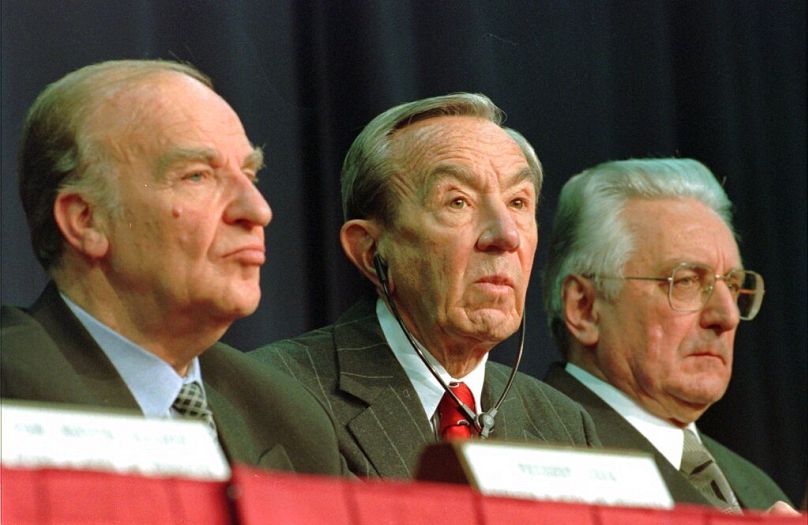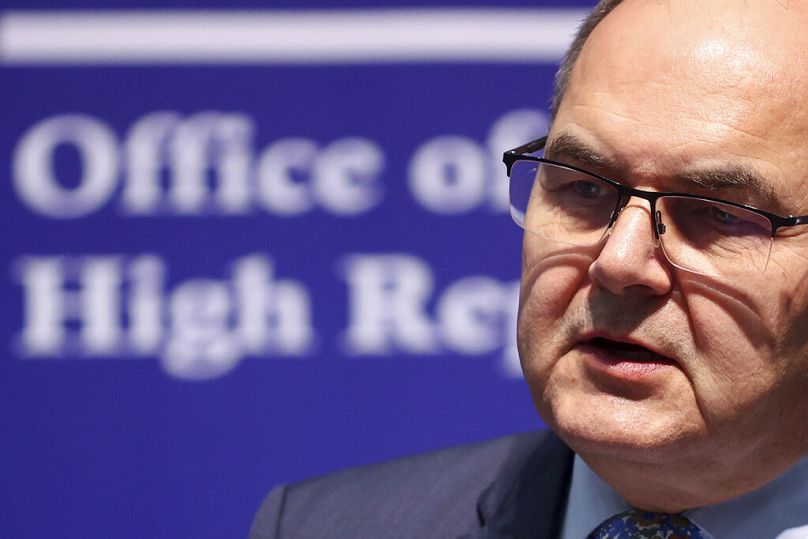The re-election of Donald Trump has already sent shockwaves across the international community, months before the 78-year-old has set foot in the Oval Office. Trump’s machinations are of existential concern for Ukraine and Taiwan, but tiny Bosnia and Herzegovina has particular — and peculiar — cause for trepidation, too.
That is because, on the eve of its 30th anniversary of creation, the legality of Bosnia’s US-authored constitution has been challenged in a landmark civil rights case at the European Court of Human Rights (ECtHR), one which has resulted in the court provisionally striking down virtually the entirety of Bosnia’s ethnic power-sharing regime.
But this ruling — the 2023 Kovačević decision — is now being appealed by a coalition of sectarian hardliners and their foreign backers. If the court abides by its own precedent and upholds the decision, it will be Trump’s administration that will preside over any subsequent attempt — or its dereliction — at constitutional reform.
Trump may side with his presumptive ideological fellow travellers — Bosnia’s sectarian hardliners — and oppose the reform of the country’s constitution. But then he would also be backing the same illiberal regime the Biden administration sought to shore up against growing civil society and political opposition. He would be resuscitating a waning political project synonymous with the Clinton administration.
If Trump commits his administration to substantive constitutional reform in Bosnia in line with the ECtHR’s rulings, he will accomplish what no US administration since 1995 has been able to achieve: progress in Bosnia. It would be an enormous diplomatic breakthrough for the self-proclaimed greatest deal-maker in American history.
Yet, putting aside the inclinations of the Trump White House, the Kovačević decision is already in peril.
Challenging ethnocracy
Bosnia and Herzegovina is often described as the most complex constitutional regime in the world, a product of the 1995 US-brokered Dayton Peace Agreement (DPA) which ended the Bosnian War.
Annex IV of the DPA serves as Bosnia’s constitution, a Byzantine document characterised by convoluted sectarian power-sharing modalities that deny large segments of the country’s populace basic rights to democratic representation.
Since 2009, however, large portions of this illiberal “ethnocracy” have been struck down by the ECtHR through a succession of decisions, all of which concern the way in which the Dayton constitution privileges ethnicity over all other legal and democratic principles in Bosnia.
The first of these decisions, the Sejdić-Finci ruling, concerned the inability of members of Bosnia’s Jewish and Romani communities to stand for the state presidency, whose tripartite membership was reserved for the country’s “constituent peoples,” ie Bosniaks, Serbs and Croats.

Following the Sejdić-Finci decision, the court continued to side with a succession of Bosnian civil rights appellants, all of whom variously argued the country’s exclusionary constitutional regime robbed them of basic democratic norms and violated the European Convention on Human Rights, which is directly embedded within the Bosnian constitution and the DPA.
Then, in August of last year, the Strasbourg court ruled in support of appellant Slaven Kovačević that Bosnia’s constitution “unfairly limited the right to vote and be elected for large segments of the population through a ‘combination of territorial and ethnic requirements’ that collectively amounted to ‘discriminatory treatment’.”
In one striking passage, the justices reflected on the historical origins of Bosnia’s constitution as a remedy to the 1992-1995 war. The erstwhile impulse towards ethnic power sharing, the court interjected, could not be used to deny Bosnian citizens basic democratic rights to representation in perpetuity.
Bosnia’s constitution had to be reformed so that even if a “system of ethnic representation is maintained in some form, it should be secondary to political representation”.
Enter Schmidt
Bosnia’s entrenched sectarian political elite hardly took the ruling in stride. Quickly, hardline nationalist elements in the country, specifically from the Croat nationalist HDZ, in coordination with the right-wing government of Andrej Plenković in Zagreb, lodged an appeal of the ruling through the official institutions of the Bosnian state, whose government they presently lead as part of a grand coalition.
They also enlisted the country’s High Representative Christian Schmidt, the chief international envoy in Bosnia and a known sympathiser of the Croat nationalist cause.
Schmidt’s repeated partisan interventions on behalf of the HDZ — which included his shocking alterations to the election laws of the country’s Federation entity as votes were being tabulated, changing the outcome of the 2022 general elections — have made him a subject of criticism and ridicule even in his native Germany.

In a written submission to the court this October, Schmidt presented himself as the ultimate arbiter of the Dayton constitution and claimed the Kovačević ruling threatened the peace and security of Bosnia, echoing the thinly veiled threats of the HDZ.
No High Representative had ever spoken out in opposition to an ECtHR ruling as Schmidt had.
- Bosnia’s future is in the EU — but it needs help to get there
- ‘They have tricked us’: Protests erupt in Bosnia over ‘discrimination’ by peace envoy
Worse, it was not even clear the former German parliamentarian was legally addressing the court as High Representative. He had never received the support of the international steering board, which oversees his office, to involve himself in the appeal.
Bosnian civil rights activists claimed he was speaking in a personal capacity and raised questions about the source of the funds that Schmidt had used to hire one of the most expensive law firms in the UK to represent him in Strasbourg.
The court’s final word
Meanwhile, the US Embassy in Sarajevo and the State Department have remained silent. Aside from a single X post in August last year, no US official has offered one meaningful remark on the Kovačević decision or the efforts by Croat nationalist hardliners, the Croatian government, or High Representative Schmidt to overturn the ruling.
Yet US officials in Bosnia routinely engage in spats with local leaders, posting lengthy condemnations of individual parliamentary sessions, detailed critiques of stalled reform processes, even weighing in on the creation of new national parks. But nothing on the fate of Bosnia’s US-brokered constitution.
It is improbable that the US does not have a view on the matter. If it is a question of respecting the independence of the ECtHR as an institution, then, if anything, the US has a particular responsibility to rein in Schmidt.
That it has not done so suggests the Biden administration tacitly supports the ploy to deny the citizens of Bosnia their basic democratic rights under the European Convention on Human Rights.
That means that the fate of Bosnian democracy rests on the shoulders of the Grand Chamber of the ECtHR. No institution is more familiar with the contradictions of Bosnia’s constitutional regime than the Strasbourg court. The justices are aware of the machinations of the Croatian government, its hardline proxies in Bosnia, and its associate Christian Schmidt.
They will also be aware of the Biden administration’s duplicitous silence masked as impartiality regarding the Kovačević case, and they will appreciate the hulking unknown that is any potential Trump administration policy regarding constitutional reform in Bosnia and Herzegovina.
And because they know all this, the court must uphold its original ruling. Not just because it is the only logical decision in keeping with its established case law. But because it is the function of the court to affirm only one basic principle, the principle of justice, not politics: fiat justitia ruat caelum.
Dr Jasmin Mujanović is a political scientist and senior nonresident fellow at the New Lines Institute. He is the author of two books, “Hunger and Fury: The Crisis of Democracy in the Balkans” and “The Bosniaks: Nationhood After Genocide”.
At Euronews, we believe all views matter. Contact us at [email protected] to send pitches or submissions and be part of the conversation.
Euronews











